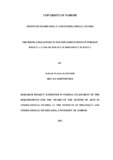| dc.description.abstract | This research study set out to investigate the rising challenges in the implementation of
Foreign policy through Sub-State diplomacy using Kenya as a case study. Sub-State
diplomacy is best defined as the conduct of international relations by regional or
devolved units with an aim of promoting self-interests. The study was guided by the
following objectives: i) To examine the global conditions under which Sub-State
governments advance sub-state diplomacy; ii) To examine the rising challenges that
emerge from foreign policy implementation by sub-state governments; iii) To examine
the constitutional and institutional mechanisms that guide foreign policy
implementation. In addition, the study seeks to answer the following questions: i) What
are the key global trends and structures in the advancement of Sub-State diplomacy? ii)
What are the challenges encountered from foreign policy implementation by Sub-State
Governments? iii) What are the constitutional and institutional mechanisms in place
that guide the conduct of Foreign policy? The theory that guided the discussion was
neo-functionalist theory which proposed a supra-territorial concept of authority that
linked collective governance and material interdependence between states holding that
society is a system of interconnected parts that cooperate and work together hence
creating a sense of social balance for the whole system. I proceeded on the basis of
assumptions that: i) 21st century globalization and the increased interdependence in the
international arena has generated motivations for Sub-State governments’ participation
in international relations. ii) Sub-State governments raise challenges to Central
government’s implementation of foreign policy. iii) Non-compliance by Sub-State
governments to constitutional rules and domestic institutional frameworks that guide
the conduct of foreign policy raise challenges to the Central government’s role of
foreign policy implementation. Constitutional rules and domestic institutions in
decentralized systems determine the implementation of foreign policy by Sub-State
governments. These assumptions were adapted into testable indicators.
Both qualitative and quantitative methodology of data collection was employed and the
findings were that: Globalization and the increased interdependence in the international
arena generate motivations for Sub-State governments’ participation in international
relations. Political challenges, constitutional limitations and lack of resources together
with compliance challenges hindered effective foreign policy implementation, and
those Sub-State governments conduct of Sub-State diplomacy is guided by the Kenyan
Constitution together with the Devolution Acts. The Ministry of Foreign Affairs in turn
coordinate the implementation of Foreign policy.
The findings of this study were that: i) Globalization and the increased interdependence
in the international arena generates motivations for Sub-State governments’
participation in international relations. ii) Political challenges coupled with
constitutional imitations, lack of resources and lack of compliance to set rules and
institutional mechanisms of foreign policy conduct hinders effective foreign policy
implementation. iii) Of all the challenges lack of compliance by Sub-State governments
to foreign policy conduct rules and institutional frameworks was a major causal factor..
The study thus recommends: On Policy Recommendations: i) Sub-State governments
engagement in foreign policy must be complementary to the national government and
Sub-State governments are obligated to render support to the Central government’s
foreign policy objectives through the enactment of appropriate policies. ii) The Central
government must assist Sub-State governments develop administrative capacity
through qualified and skilful staff to coordinate the conduct of foreign policy. iii) The
Central government should consult Sub-State governments during treaty negotiations
particular on issues that touch on them. iv) The Ministry of Foreign affairs in
partnership with the Sub-State governments should establish an implementation,
monitoring and evaluation plan for all the Memorandum of Understandings signed by
the Sub-State governments. v) Sub-State governments should established a specific unit
tasked with the responsibility of all international affairs conducts. This department
should take the responsibility of providing appropriate administrative and technical
support to the county personnel on all issues of international relations and also act as
the office tasked with coordinating interactions with the Ministry of Foreign Affairs.
On academic recommendations: i) State diplomacy should be a focus topic in
institutions of higher learning with in-depth discussions provided for the subject area.
ii) Materials in terms of information resources on this subject area should be made
available in the Public libraries. iii) More research on this topic expressly in the Case
of Kenya should be pursued. Further research is also recommended on Sub-State
diplomacy in Kenya and Africa as a whole due to the limited scholarly work available.
In addition, the complex scholarly interpretation of Sub-State diplomacy begs for
further research of the phenomenon. | en_US |



